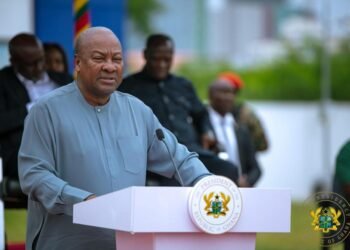In the wake of the Supreme Court’s ruling on the Vacant Seats case, Osagyefo Mawuse Oliver Barker-Vormawor, a legal practitioner and constitutional activist, has expressed deep admiration for the dissenting opinion authored by Justice Amadu Tanko.
In an incisive commentary, Barker-Vormawor described Justice Tanko’s dissent as “profoundly erudite,” contrasting sharply with the majority’s ruling.
“The dissent shows both the moral urgency and the intellectual dexterity that is reminiscent of some of the greatest decisions this country has ever seen. It was a great nostalgic feeling to read him and the constitutional clarity of mind he exhibits”.
Osagyefo Mawuse Oliver Barker-Vormawor, Legal Practitioner and Constitutional Activist
Justice Tanko’s approach, as seen through Oliver Barker-Vormawor’s perspective, is a masterclass in the art of judicial analysis—methodical, mature, and unhurried.
He pointed out that Justice Amadu Tanko’s dissection of the case reflects an acute awareness of constitutional principles and an unyielding commitment to the foundational pillars of constitutional jurisdiction. This, he suggested, set Justice Amadu Tanko apart from his colleagues on the bench, who struggled to maintain logical consistency.
Oliver Barker-Vormawor, who served as a Constitutional Researcher and the Access to Justice Advisor to Ghana’s 2010/11 Constitution Review Commission conveyed a palpable sense of shared frustration and admiration as he described Justice Tanko’s honest, yet exasperated, plea for the reversal of the decision.
Embodiment of Integrity
He depicted Tanko’s dissent as the cry of a jurist who profoundly respects the Supreme Court and is pained to see its values slipping away. It’s the prayer of a man who so loves the Court and who now sees his vocation and its core values slip away,” Barker-Vormawor wrote, adding that Justice Tanko’s dissent is an embodiment of integrity that counters the current wave of “unanimous decisions” in the court.
The legal activist did not mince words in critiquing the majority’s opinion, suggesting that it was marked by an effort to grasp at logical straws and a struggle to sustain a coherent argument.

In stark contrast, Tanko’s dissent stood as a beacon of rationality, breathing life into a bench that Barker-Vormawor implied has become mired in predictability and conformity.
For Barker-Vormawor, Justice Tanko’s dissent signifies a rejuvenation of the kind of critical judicial thought that has been absent for too long. “I feel alive again!” he exclaimed, capturing the sense of intellectual revival inspired by the dissent.
He concluded his commentary with a note of optimism, asserting that Justice Tanko’s contributions will be vindicated by history: “Posterity will set you right!”
This stirring endorsement by Barker-Vormawor underscores the deep divide within Ghana’s judiciary over the interpretation of constitutional mandates and reflects a broader concern among legal scholars and activists regarding the integrity and independence of judicial reasoning.
Justice Tanko’s dissent, as portrayed by Barker-Vormawor, stands not only as an act of judicial defiance but also as a testament to the enduring struggle for constitutional fidelity.
READ ALSO: GSE and Fintechs Join Forces to Develop Investment Solutions for Every Ghanaian



















